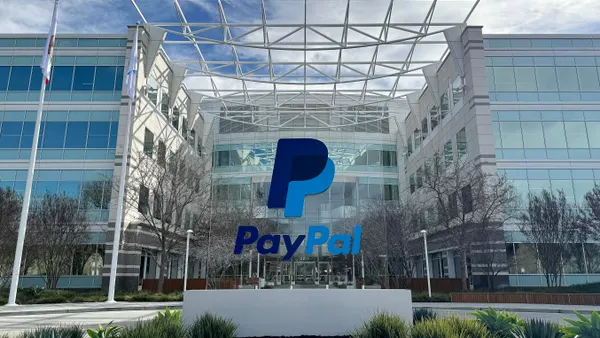Dive Brief:
-
Cryptocurrency companies BitPay and Paxos filed applications with the Office of Comptroller of the Currency (OCC) to become national trust banks last week, a sign a growing number of nonbanks are eyeing national bank charters.
-
New York-based Paxos announced its application for a charter in a Dec. 9 blog post, where Dan Burstein, the company's general counsel and chief compliance officer, said a national trust bank charter would provide the firm "with flexibility to operate across the US while continuing to adhere to the highest regulatory standards." National trust bank charters do not require deposit insurance.
-
Atlanta-based BitPay detailed its charter application in a Dec. 8 legal notice published in the Atlanta Journal-Constitution, which was first reported by The Block.
Dive Insight:
"The national charter was designed expressly to allow banks to conduct business across state lines more easily," Burstein wrote in a blog post. "This flexibility allows a young company like Paxos to focus resources on building great products."
BitPay and Paxos's applications follow another crypto firm, Anchorage, that recently threw its hat in the ring. The digital asset custodian filed its application for a bank charter with the OCC last month, according to CoinDesk.
Since taking the helm of the OCC in May, acting Comptroller Brian Brooks has made clear his intention to allow fintechs and payments companies access to the nationwide financial system without needing a license in all 50 states.
From the ongoing fight over the OCC fintech charter — which is embroiled in a legal battle — to the regulator's September introduction of a payments charter, the agency is responding to the growing trend of "unbundling," as companies increasingly offer financial services outside of the traditional banking system.
"Do we let 38% of lending leave the banking system and no longer supervise it?" Brooks said at a LendIt Fintech virtual conference in September. "I'm not saying supervision is the end-all, be-all. But there is risk in this business, and no one is managing it."
Lawmakers and trade groups, however, have pushed back regarding the OCC's efforts to grant charters to nondepository institutions.
"We oppose the OCC's effort to grant commercial companies like Amazon or Facebook a national payments charter to access to the Federal Reserve payments system and safety net ... without protecting the financial system and consumers from the concomitant increase in systemic risk," the American Bankers Association, the Bank Policy Institute, the Independent Community Bankers of America and The Clearing House wrote in a letter to lawmakers in September.
Under Brooks, whom President Donald Trump plans to nominate to serve a full five-year term, the OCC has taken other crypto-friendly actions that have attracted criticism from lawmakers, such as allowing nationally chartered banks to provide crypto custody services for customers.
House Financial Services Committee Chairwoman Maxine Waters, D-CA, sent a letter to President-elect Joe Biden this month, calling for the former vice president to rescind or monitor all of the crypto-related guidance issued by the OCC.
Meanwhile, Burstein, in his blog post, said he believes the regulation of digital assets "is in the early innings."
"Conversations around digital assets between regulators and market participants are only increasing in frequency and depth, and Paxos enthusiastically supports principles-based regulation that encourages innovation and mitigates risk," he wrote. "As we grow, we'll remain committed to engaging with state and federal regulators — as well as those around the world."












